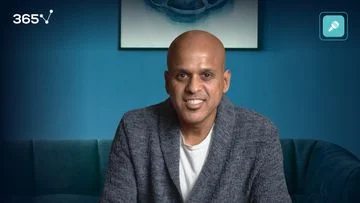
Breaking into data science is a long and winding road that requires technical and soft skills and a lot of resilience. We spoke to renowned industry experts and well-liked names in the data science community to discover how and when they knew they had what it takes for a career in the field. They shared their stories and the qualities they developed to succeed.
In this interview, we introduce you to data science and clustering specialist Shaun Moloi. With a background in the retail, e-commerce, and consulting industries, Shaun leverages advanced analytics and machine learning techniques to drive business success and unlock valuable customer insights. Keep reading to learn more about his data science journey and when he knew he had what it took to succeed.
Interview with Shaun Moloi
Would you please tell us a bit about your background and journey into data science?
After the realization set in that I may not be the greatest well-known soccer player in my youth—I wasn’t even that good at soccer—I invested my time in playing computer games and being curious about how all these virtual worlds are created, which led me to pursue computer science at university.
After completing my BSc computer science degree at the University of the Witwatersrand, I started my career as a software engineer. I was exposed to various projects involving the architecture of models, data analytical tools, and system deployment. My initial job role further piqued my interest in data-driven decision-making and led me to pursue to branch into data science.
I am currently working as a data science specialist at one of the largest retail organizations on the continent while completing my master's degree at the University of Cape Town. Throughout the last six years of my data science career, I've had the opportunity to work across multiple industries, including consulting, e-commerce, and investments. The diversity of these experiences has helped me understand the power and impact of data-driven insights across various domains.
When did you know you have what it takes?
I clearly remember in the first year of mathematical statistics class, where we learned about probability and how to predict future events using data. Being able to foresee the future seemed like having superpowers, and I fell in love with predictive analytics.
At the time, I had never heard the name data scientist, but all I wanted was to work in the future as someone with the superpowers to predict the future. Over the years, I realized having a strong technical foundation in programming and statistics, combined with my curiosity for solving complex challenges using data, solidified my confidence in having what it takes to pursue a career in data science.
As a data scientist, one needs strong analytical thinking and a lot of technical know-how. What skills did you start with, and how did you develop them to meet the role requirements?
As a result of my university courses, I had a firm grounding in programming, database management, and statistical analysis. But, as a student, it’s simple to separate individual abilities and forget the overall picture. Participating in online data science competitions helped me develop and integrate these abilities. I started developing and weaving these skill sets together when building functional solutions to the proposed fictional business problems on Kaggle.
These competitions developed my data science skillset to solve business problems and meet the role requirements. I also found it valuable to engage with the data science community through conferences and meetups, where I could learn from my peers and stay updated on industry trends.
Learning is a lifelong process—especially in a field that's as dynamic as data science. Is there something new you'd like to learn more about or become better specialized in?
I am constantly excited about exploring new techniques and technologies in the field. I’m interested in deep learning—specifically big data real-time analytics and computer vision. These areas have shown tremendous potential for practically visualizing insights from large datasets and solving complex business problems as they occur. I am eager to expand my expertise in these domains.
As an expert in the field, you must have an ample idea of the qualities a person needs for data science. What would you say those are?
Curiosity and originality are essential traits for any successful data scientist. A genuine interest in the data field keeps one keen to learn and explore data to discover hidden patterns and develop innovative solutions for unique problems.
Data science is one of the few fields where one may deal with any data—thanks to the present era of the data revolution. The key to solving, optimizing, and anticipating any business problem is to be inquisitive about the data.
One of the other important skills of a data scientist is a high level of technical knowledge and analytical ability. Understanding how to use technological means and tools to problems involving complicated datasets is essential.
Last but not least, it’s crucial to share one's discoveries and thoughts with both technical and non-technical audiences. As a data scientist, you'll interact with people from different departments and at all levels of the organization. So you should be as comfortable explaining logistic regression to marketing as you are to your team.
As the industry develops, the demand for skilled data scientists grows exponentially. What gives an aspiring data scientist a competitive edge in 2023?
The data science skillset has evolved. To stand out in the competitive landscape of 2023, aspiring data scientists should focus on becoming full-stack professionals with a broad range of capabilities across multiple data science domains. This means they can handle all aspects of a project, from data acquisition to delivering actionable insights or even deploying machine learning models into production. A full-stack data scientist is a jack of all trades.
Organizations are always looking for candidates who can create production-ready minimum viable projects that are scalable and easy to implement in a cloud environment, such as Microsoft Azure, Amazon Web Services, or Google Cloud Platform.
We want to thank Shaun for taking the time to provide valuable insights into what it takes to be a data scientist.
Our aim at 365 is to equip you with the tools and give you the necessary guidance to succeed. Designed never to let you give up, the 365 Data Science platform has what you need to develop your qualities and skills.
Go from a beginner to a skilled professional who creates data-driven value. Study the statistics and probability theory behind data science with online courses led by our renowned instructors, and master sought-after skills like Excel, SQL, and Tableau. Prove you’ve got what it takes with industry-recognized certificates.




